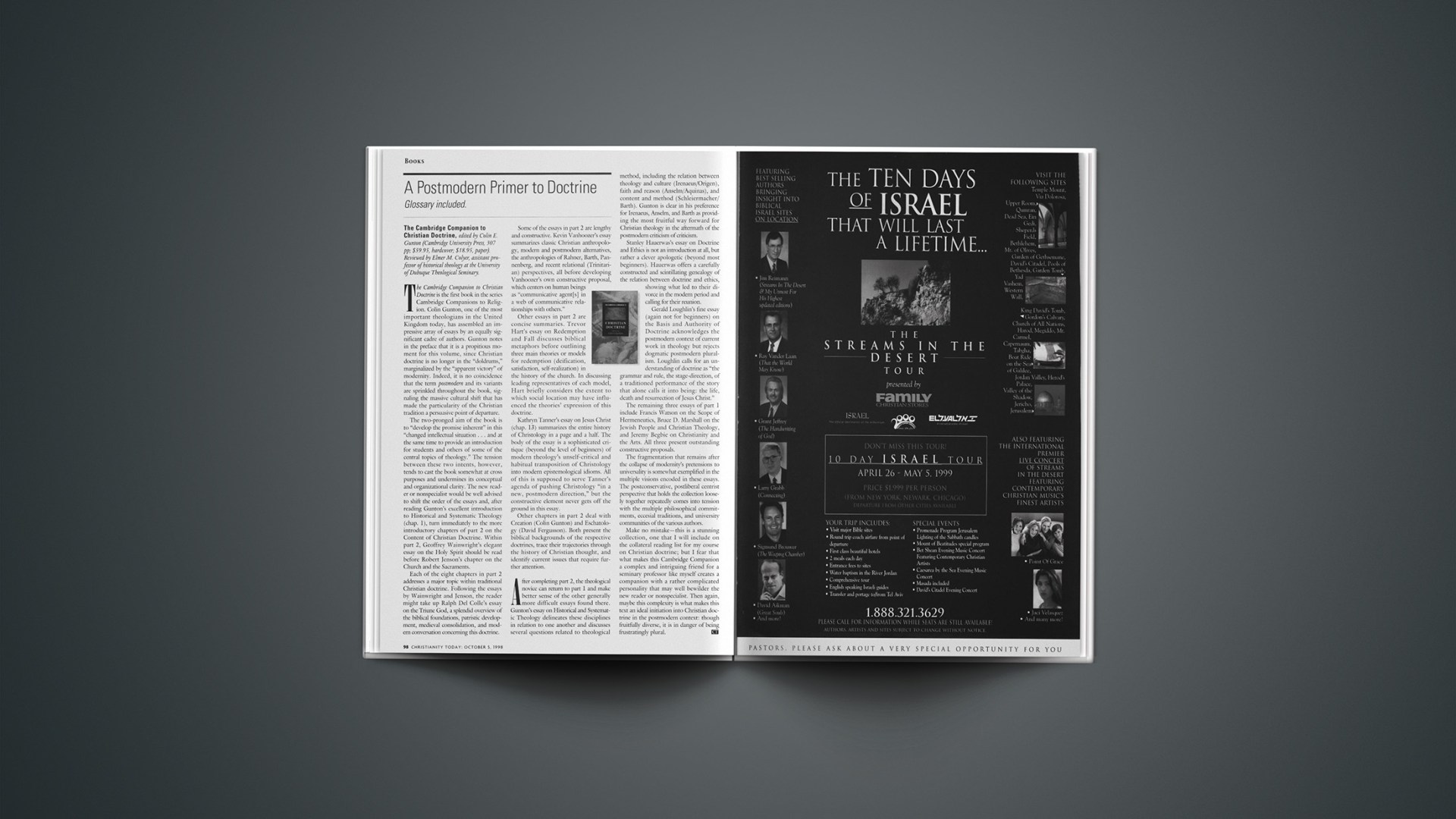The Cambridge Companion to Christian Doctrine, edited by Colin E. Gunton (Cambridge University Press, 307 pp; $59.95, hardcover; $18.95, paper). Reviewed by Elmer M. Colyer, assistant professor of historical theology at the University of Dubuque Theological Seminary.
The Cambridge Companion to Christian Doctrine is the first book in the series Cambridge Companions to Religion. Colin Gunton, one of the most important theologians in the United Kingdom today, has assembled an impressive array of essays by an equally significant cadre of authors. Gunton notes in the preface that it is a propitious moment for this volume, since Christian doctrine is no longer in the “doldrums,” marginalized by the “apparent victory” of modernity. Indeed, it is no coincidence that the term postmodern and its variants are sprinkled throughout the book, signaling the massive cultural shift that has made the particularity of the Christian tradition a persuasive point of departure.
The two-pronged aim of the book is to “develop the promise inherent” in this “changed intellectual situation . . . and at the same time to provide an introduction for students and others of some of the central topics of theology.” The tension between these two intents, however, tends to cast the book somewhat at cross purposes and undermines its conceptual and organizational clarity. The new reader or nonspecialist would be well advised to shift the order of the essays and, after reading Gunton’s excellent introduction to Historical and Systematic Theology (chap. 1), turn immediately to the more introductory chapters of part 2 on the Content of Christian Doctrine. Within part 2, Geoffrey Wainwright’s elegant essay on the Holy Spirit should be read before Robert Jenson’s chapter on the Church and the Sacraments.
Each of the eight chapters in part 2 addresses a major topic within traditional Christian doctrine. Following the essays by Wainwright and Jenson, the reader might take up Ralph Del Colle’s essay on the Triune God, a splendid overview of the biblical foundations, patristic development, medieval consolidation, and modern conversation concerning this doctrine.
Some of the essays in part 2 are lengthy and constructive. Kevin Vanhoozer’s essay summarizes classic Christian anthropology, modern and postmodern alternatives, the anthropologies of Rahner, Barth, Pannenberg, and recent relational (Trinitarian) perspectives, all before developing Vanhoozer’s own constructive proposal, which centers on human beings as “communicative agent[s] in a web of communicative relationships with others.”
Other essays in part 2 are concise summaries. Trevor Hart’s essay on Redemption and Fall discusses biblical metaphors before outlining three main theories or models for redemption (deification, satisfaction, self-realization) in the history of the church. In discussing leading representatives of each model, Hart briefly considers the extent to which social location may have influenced the theories’ expression of this doctrine.
Kathryn Tanner’s essay on Jesus Christ (chap. 13) summarizes the entire history of Christology in a page and a half. The body of the essay is a sophisticated critique (beyond the level of beginners) of modern theology’s unself-critical and habitual transposition of Christology into modern epistemological idioms. All of this is supposed to serve Tanner’s agenda of pushing Christology “in a new, postmodern direction,” but the constructive element never gets off the ground in this essay.
Other chapters in part 2 deal with Creation (Colin Gunton) and Eschatology (David Fergusson). Both present the biblical backgrounds of the respective doctrines, trace their trajectories through the history of Christian thought, and identify current issues that require further attention.
After completing part 2, the theological novice can return to part 1 and make better sense of the other generally more difficult essays found there. Gunton’s essay on Historical and Systematic Theology delineates these disciplines in relation to one another and discusses several questions related to theological method, including the relation between theology and culture (Irenaeus/Origen), faith and reason (Anselm/Aquinas), and content and method (Schleiermacher/Barth). Gunton is clear in his preference for Irenaeus, Anselm, and Barth as providing the most fruitful way forward for Christian theology in the aftermath of the postmodern criticism of criticism.
Stanley Hauerwas’s essay on Doctrine and Ethics is not an introduction at all, but rather a clever apologetic (beyond most beginners). Hauerwas offers a carefully constructed and scintillating genealogy of the relation between doctrine and ethics, showing what led to their divorce in the modern period and calling for their reunion.
Gerald Loughlin’s fine essay (again not for beginners) on the Basis and Authority of Doctrine acknowledges the postmodern context of current work in theology but rejects dogmatic postmodern pluralism. Loughlin calls for an understanding of doctrine as “the grammar and rule, the stage-direction, of a traditioned performance of the story that alone calls it into being: the life, death and resurrection of Jesus Christ.”
The remaining three essays of part 1 include Francis Watson on the Scope of Hermeneutics, Bruce D. Marshall on the Jewish People and Christian Theology, and Jeremy Begbie on Christianity and the Arts. All three present outstanding constructive proposals.
The fragmentation that remains after the collapse of modernity’s pretensions to universality is somewhat exemplified in the multiple visions encoded in these essays. The postconservative, postliberal centrist perspective that holds the collection loosely together repeatedly comes into tension with the multiple philosophical commitments, ecclesial traditions, and university communities of the various authors.
Make no mistake-this is a stunning collection, one that I will include on the collateral reading list for my course on Christian doctrine; but I fear that what makes this Cambridge Companion a complex and intriguing friend for a seminary professor like myself creates a companion with a rather complicated personality that may well bewilder the new reader or nonspecialist. Then again, maybe this complexity is what makes this text an ideal initiation into Christian doctrine in the postmodern context: though fruitfully diverse, it is in danger of being frustratingly plural.










